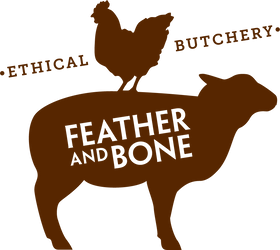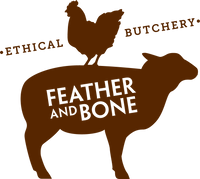Waste not, want not - a story in 3 parts
Here's a heart-warming, three-part tale about a small, resourceful farmer who's found a way to solve a big, wasteful problem and the customer who's taken that solution to dizzying heights.
Lord knows we could all use some good news right now, so hopefully you'll find this story as inspiring as we do.

1. Let's start with the problem - food waste on farms.
We've all heard about food waste in the distribution and consumption end of the supply chain, but no one talks much about what happens on farms.
About 40% of all food produced is wasted (accounting for 10% of all Greenhouse Gas Emissions) and 15.3% of that amount is lost BEFORE any food even leaves the farm. This statistic is upsetting on many levels, not least of which is the fact that in natural systems there's no such thing as waste - everything is used and consumed - so surely farm waste is avoidable?
In late July, WWF published an arresting report called 'Driven to Waste' that examines this farm-stage waste problem. Some food loss occurs from weather events or harvesting problems but a significant amount is caused by external pressures. For example, farmers leave produce in the field due to surplus stock, order cancellations or because produce doesn't meet retail expectations. Surprise, surprise, the report concluded that changes in human behaviour all the way along the supply chain is key to addressing food waste. Check out the report, it's fascinating.
One example of farm-stage food waste caused by human choices is the destruction at birth of 50% of commercial egg chickens. These chicks are unfortunate enough to be born male, a characteristic that makes them useless in the egg industry.
Before you say, 'why don't we eat them?', have you ever eaten a rooster laid by a chicken bred specifically to produce eggs? I'd wager not. This is because chickens bred exclusively to pump out eggs everyday to meet market demand don't usually make great table birds so there's no obvious market for male chicks in the egg industry. They are simply a waste by-product.
Which leads us to the second part of this story.

2. A solution - Llandilo Heritage Cockerels
Meet Ryan and Rebecca Cinello of R & R Roosters and their fabulous Llandilo Heritage Cockerel farm. That's Rebecca above, snapped with some of the boys she pasture-raises for Feather and Bone for the Young Farmers Connect Changing Face of Farming campaign.
Llandilo Heritage Cockerels is an ingenious response to the problem of farm waste.
Situated at Llandilo, a semi-rural area near Windsor on Sydney's furthest fringe, Ryan and Rebecca have built a small business around rescuing day-old, male, Rhode Island Red/Australorp breed chicks from a local egg producer. Rhode Island Reds are hardy layers but hardly table birds. However, the addition of the slow-growing Australorp genetics provides hybrid vigour and the result is a strong, dual-purpose bird with great flavour. The Cinellos grow the cockerels out until they're on the brink of maturity, slaughtering them on-farm and selling them as table birds.
We're enthusiastic about everything this family farm offers.
- It's a compassionate and productive way to turn waste into nutrition.
- It adds rare, genetic diversity to the meat chicken industry.
- It's a local food business in the Sydney basin (increasingly rare).
- The birds are raised and processed in one place (very unusual in small-scale farming).
- The slow-growing, pasture-raised cockerel produces an excellent meat chicken.
As Rebecca says, "If you eat eggs, whether they are laid by your hens at home or store bought, then you should also eat rooster."
The Cinellos grow Feather and Bone cockerels out on pasture for 16-20 weeks (three-four times longer than conventional meat chickens) and we air dry them here at Feather and Bone. As you'd imagine, Llandilo Heritage cockerels are markedly different to white broiler chickens and more like a Sommerlad Heritage bird; long, powerful legs, strong bones and smaller breasts. The feedback from our customers - domestic and restaurants - is very good.
Which leads us to the third part of today's tale.

3. The customer - Norman Lee's cockerel yakitori
This week, Norman Lee cooked a whole Llandilo cockerel and completed the story.
Norman Lee is famous among Sydney food businesses for his warmth, generosity and unbridled enthusiasm for everything to do with food and cooking. He'll appear at our shop, sometimes with his lovely wife, Joyce, invariably clutching a gift of something he's made or grown - a stunning Dahlia flower or a jar of mysterious-looking fermented goodness - and always has a story about something he's discovered on his culinary adventures around Sydney. Norman has three recipes in our book, The Ethical Omnivore, that showcase tongue and hearts and, while he's modest to a fault, his cooking skills put most professional chefs on notice.
This week, Norman jointed a whole Llandilo cockerel and turned it into a yakitori feast, carefully observing the carcass and preparing each section to showcase the different qualities of the meat across the bird, even filleting the neck to yield a single, delicious skewer. As Norman commented;
"There is very little fat under the skin and the thigh meat is darker and has more connective tissues. Breast meat is thinner and more delicate. The skin also has different textures and flavours - thigh skin is more bouncy, breast skin is more tender and back skin is the fattiest and crispy after grilling. The cockerel chicken flavour is more intense and it has a pleasing toothsome bite."
Now, of course, you and I could do this too, and usually do on a lazy Sunday afternoon, but the thing to note here is that Norman didn't waste a morsel of his lovely cockerel. Because alongside his creativity and skill, Norman is motivated by the same care, respect, ingenuity and abhorrence of waste as Ryan and Rebecca Cinello at their cockerel farm.
So there you have it. Just because there's a multi-billion dollar industry organised around waste doesn't mean we have to put up with it.
For those of you who'd prefer a simpler preparation method for your cockerel, they make a lovely roast and the carcass makes great stock.
Here are some more photos of Norman's wonderful yakitori feast.









This is such an inspiring story. Congratulations to Ryan and Rebecca, Feather and Bone and others who are involved in the business of supplying ethical food with thought of production, environment and waste. As a former farmer I appreciate all that is being done by inspirational and innovative producers.
Hi Laura,
This story is inspiring. Well done to the innovative couple who raise these roosters and I am sure their business is reliant on your retailing expertise and wonderful chefs who understand real food. My husband and I have been organic farming in the Riverina for over 30 years and I feel I have a good handle on ethical and holistic food production however that has not solved my hesitancy to kill and dress the seven roosters I have eating me out of house and home. Maybe tomorrow….
I just caught up on your conversation with Jade on The Futuresteading podcast and want to assure you of the absolute essential need for businesses like yours to market, and educate about, the produce of regenerative, holistic farms. We are usually not equipped with the skills, the time or the interest in marketing our meat and grains but this has to be done by someone. We need to pay for this service while still getting a decent price for our goods. You and people like you are essential to our food network and thank you. We just need more businesses like yours.
Jenny
Leave a comment